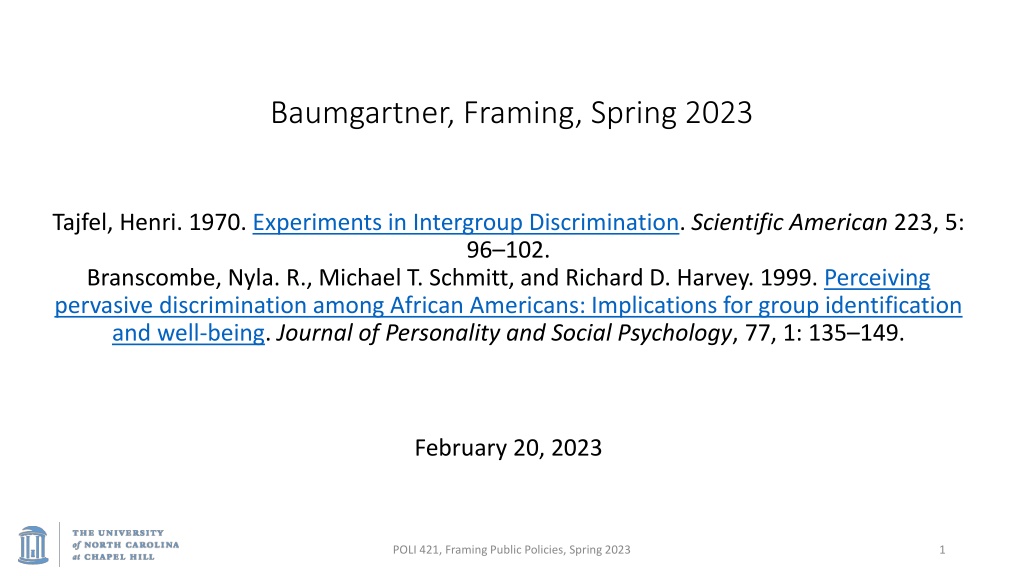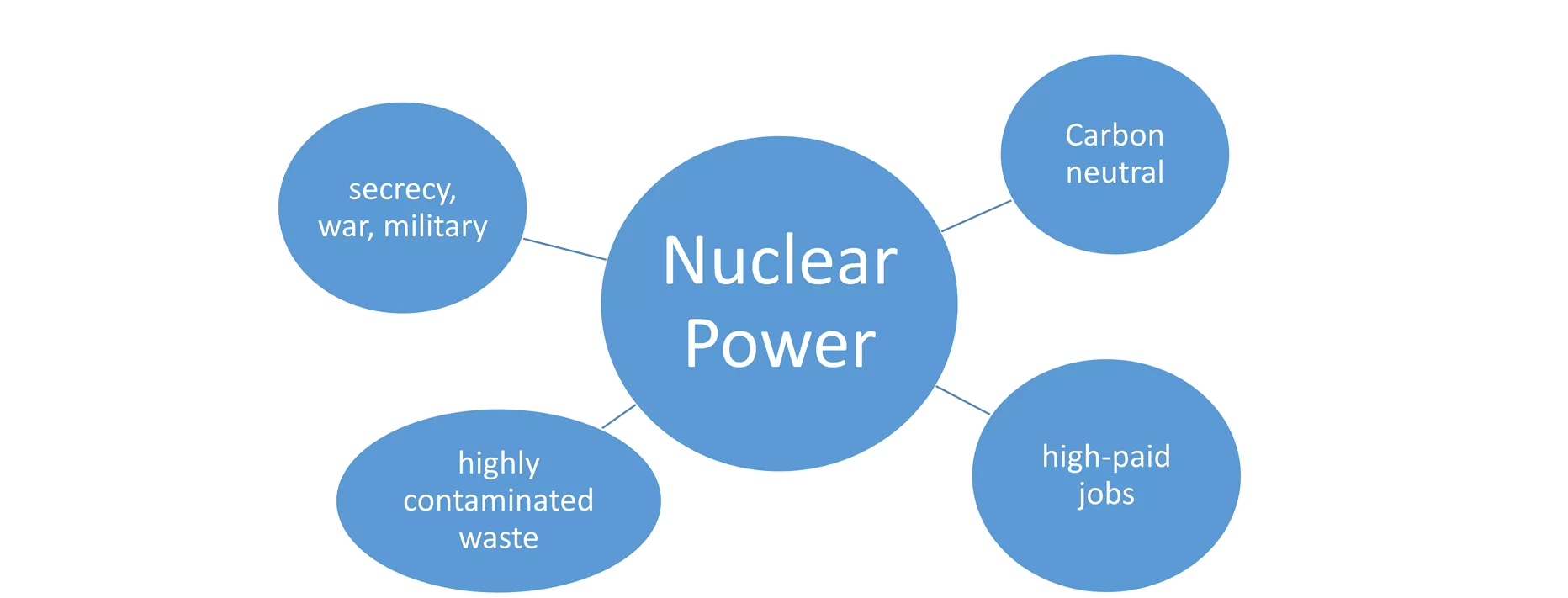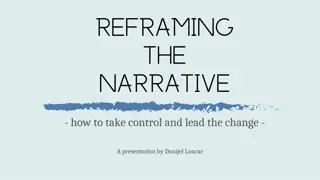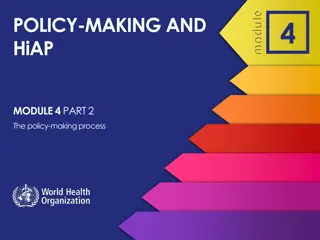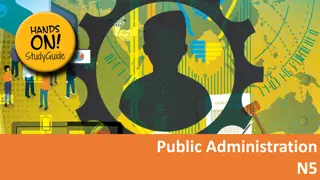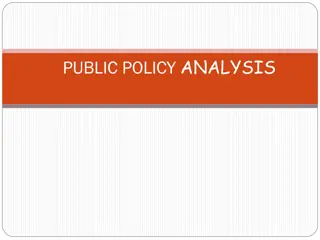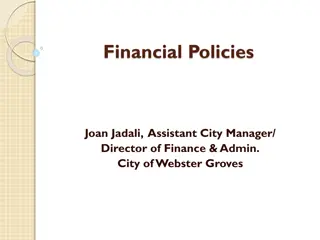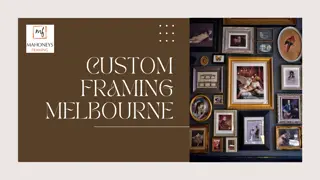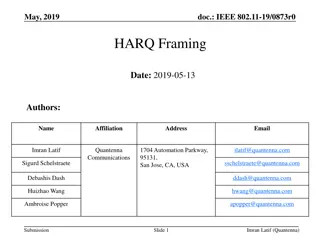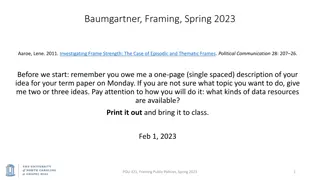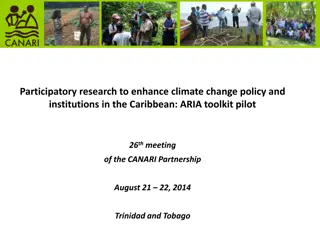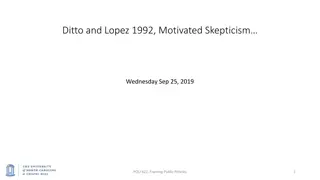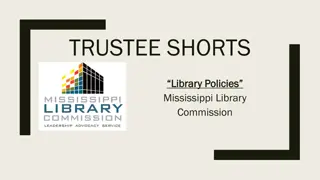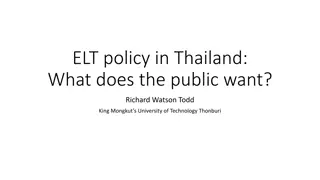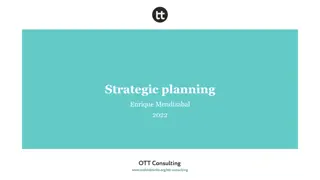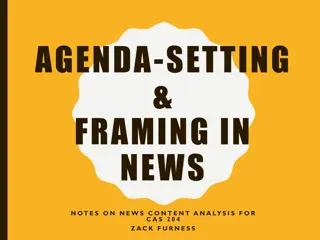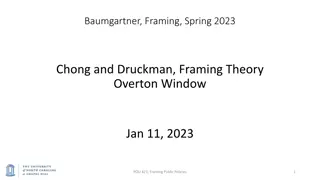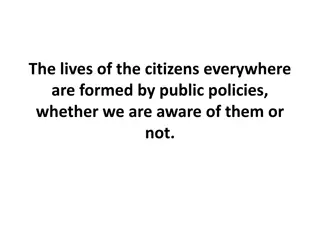Understanding Policy Change Through Framing in Public Policies
The study of framing in public policies delves into the dynamics of policy change and how different perspectives influence our understanding of complex issues. This process sheds light on the cognitive aspects underlying political ideologies and the sudden shifts in frames over time. An upcoming term paper deadline emphasizes the importance of researching the history of chosen policies and using academic citations to shape the framework for analysis.
Download Presentation

Please find below an Image/Link to download the presentation.
The content on the website is provided AS IS for your information and personal use only. It may not be sold, licensed, or shared on other websites without obtaining consent from the author. Download presentation by click this link. If you encounter any issues during the download, it is possible that the publisher has removed the file from their server.
E N D
Presentation Transcript
Baumgartner, Framing, Spring 2023 Tajfel, Henri. 1970. Experiments in Intergroup Discrimination. Scientific American 223, 5: 96 102. Branscombe, Nyla. R., Michael T. Schmitt, and Richard D. Harvey. 1999. Perceiving pervasive discrimination among African Americans: Implications for group identification and well-being. Journal of Personality and Social Psychology, 77, 1: 135 149. February 20, 2023 POLI 421, Framing Public Policies, Spring 2023 1
Some preliminaries Interesting story from Feb 18 about the US government s sudden discovery of the dangers of crypto-currencies and how to regulate the industry: https://www.nytimes.com/2023/02/18/business/crypto-crackdown-regulation.html An interesting element there is how a crypto person complains that the new regulations coming from so many different government operators are like carpet-bombing the industry. How an industry goes from do no wrong to do no right in about 20 seconds is what we were talking about in the nuclear power article you read. This stuff is constantly happening all around us. POLI 421, Framing Public Policies, Spring 2023 2
Recall this slide from the first lecture. Replace nuclear power in the center with Crypto- currencies. How many associations are there? Carbon neutral secrecy, war, military Nuclear Power high-paid jobs highly contaminated waste POLI 421, Framing Public Policies 3
The study of framing is the study of policy change. When we are looking at frames, it s not only why two people differ in their understanding of the same issue. That is of interest as well, of course, as it underlies political ideologies. We are also interested in how and why frames suddenly flip, in the aggregate. A key element in this is how, at any given time, we tend vastly to over- simplify complicated issues. Because of this, we can suddenly discover something that should have been obvious all along. This is not a pathology, but rather a characteristic of human cognition. POLI 421, Framing Public Policies, Spring 2023 4
A second preliminary: term paper progress March 1 deadline, a week from Wednesday: Give me 2-3 pages (double spaced) explaining the history of whatever policy you are going to study and showing me about five quality academic citations on the topic. That is, you should START your project by a review of what other people have written about it. After you have that, it will be easier to develop your list of frames, keywords, positive and negative search terms. But for now, don t worry about that. Get the academic citations / literature, and review it. Write that up, and that s what s due a week from Wednesday. POLI 421, Framing Public Policies, Spring 2023 5
Final preliminary item On Wed, in addition to regular lecture / discussion, I ll also give you a demonstration of what I can do for you after you do your computer key- word searches, so you know the next steps in this process. The hard work, as I ve said many times, is generating a reliable and accurate set of key-words. Once you have that, I ll show you on Wed how easy the rest of the project is. So, in your head right now, you should be thinking, if my topic were crypto-currencies , what were the positive and the negative clusters of phrases or terms that could be said about that particular issue? One way to think of it: If you were the CEO of some company selling this product, would you be Happy or Sad to see a given item appearing in the newspaper? That s what we mean by valence or position. Keep it simple. POLI 421, Framing Public Policies, Spring 2023 6
Social identity theory Where does racism, sexism, other -isms, prejudice, and discrimination come from? Tajfel was among the first psychologists to really focus on the drivers of this, and this article was a popularized version of his research. Take it to the most basic level: Children simplify things. We v. they is about as simple as you can get. Whenever we are confronted with a situation to which some form of intergroup categorization appears directly relevant, we are likely to act in a manner that discriminates against the outgroup and favors the ingroup. POLI 421, Framing Public Policies, Spring 2023 7
Whenever we are confronted with a situation to which some form of intergroup categorization appears directly relevant, we are likely to act in a manner that discriminates against the outgroup and favors the ingroup. Examples? Small talk and chit chat is often about finding some kind of common ground. Once that common ground is established, then in-group status is formed. The car salesman can make the sale, since you ll trust him. Think of political and non-political examples of this . POLI 421, Framing Public Policies, Spring 2023 8
His theory If that statement is true, then the mere establishment of groups and therefore an in-group and an out-group, should have consequences. Note that he specifically asserts that there need be no animosity nor any conflict, nor any personal benefit to the individual from discriminating against members of the outgroup. It is the mere establishment of groups. So, this is pretty scary and basic, if his theory is true. POLI 421, Framing Public Policies, Spring 2023 9
The data 64 boys from a secondary school in Bristol, England, aged 14 and 15. Establish groups based on a fake experiment assessing how many dots are on a screen. Over-estimators and under-estimators better and worse accuracy (In fact, all were random.) (Study later recreated in many different ways.) Allocate points (money) to members of the in-group: fair. Out-group: fair. Across the two groups: Favor the in-group, discriminate financially against the outgroup. Note the care of the study, no real reason to do this other than just the fact of being a member of a (fake) group that you will never see again POLI 421, Framing Public Policies, Spring 2023 10
Social identity theory (SIT) is pretty basic Of course, lots of research since these early articles in the 1950s and 1960s What are ways that you see political actors creating groups ? What about outside the realm of politics? POLI 421, Framing Public Policies, Spring 2023 11
Branscombe, Schmitt, and Harvey Coping with Prejudice Others had studied where outgroup hostility comes from They focus on what happens when you are the target of hostility Greater in-group identification. (Also, as a result of that, greater mental well-being, self-esteem, and so on.) Having strong group identity allows one to overcome hostility and maintain positive self-assessments. Suffering from prejudice generates greater group-identification POLI 421, Framing Public Policies, Spring 2023 12
Recent studies: Kashubs in Poland (look that up if you don t know), obese people Olko , Justyna, Karolina Hansen, Micha Wypych, Olga Kuzawi ska, and Mac j Ba dur. 2020. From discouragement to self-empowerment. Insights from an ethnolinguistic vitality survey among the Kashubs in Poland. PLoS-ONE. 15(8): e0237395. https://doi.org/10.1371/journal.pone.0237395 Wellman, Joseph D., Ashley M. Araiza, Tuong-Vy C. Nguyen, Adam J. Beam, and Sukhmani Pal. 2022. Identifying as fat: Examining weight discrimination and the rejection-identification model. Body Image 41: 46- 51. There are lots of examples in the literature: when groups feel they are unfairly being discriminated against, they become more aware of their shared identity and need to have solidarity POLI 421, Framing Public Policies, Spring 2023 13
What are the implications of this research? Outgroup-hostility generates in-group solidarity Let s talk about examples of where that happens. So there can be counter-productive behaviors in this realm. What do you think about anti-CRT activism with regards to this research? Establish a group that is being attacked (hetero white men?). Assert prejudice against them. Result: stronger in-group identity. We re seeing this all around us. POLI 421, Framing Public Policies, Spring 2023 14
Dog-whistles We use this term with regards to playing the race card in US politics. But if you pay attention, writers attempt to establish in-group identity in many ways. Similarly, writers / speakers attempt to establish distinctions or out- group identities routinely as well. Lots of framing is just about establishing group identity POLI 421, Framing Public Policies, Spring 2023 15
